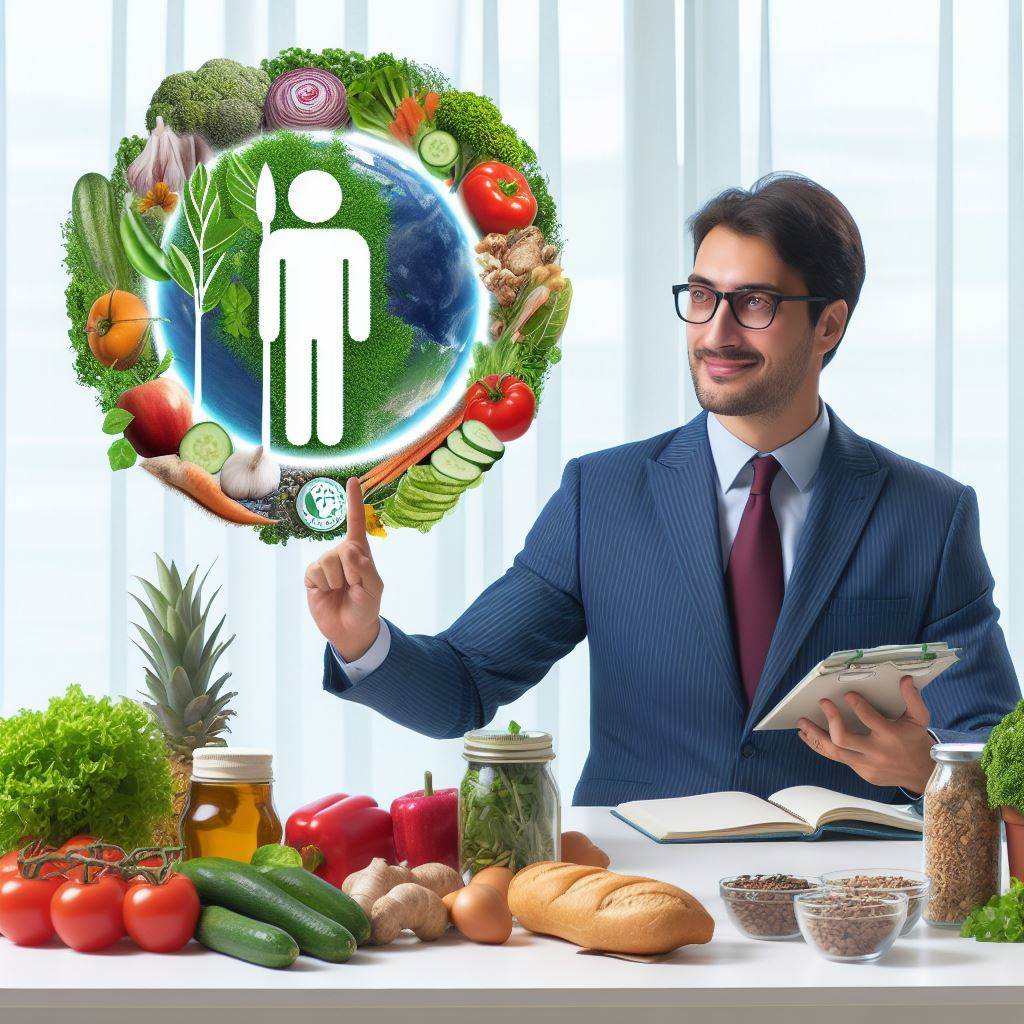Introduction
In the dynamic realm of 2024, sustainable eating emerges as a pivotal concept, bridging environmental well-being and personal health.
Experts in the field are poised to illuminate us on this crucial topic.
Sustainable eating is more than a trend; it’s a mindful approach to food choices that considers the environmental impact.
It’s about making decisions that benefit both our health and the planet we call home.
This concept emphasizes locally sourced, organic produce, reducing the carbon footprint associated with food production and transportation.
It encourages mindful consumption, fostering a connection between individuals and their food sources.
The significance of sustainable eating extends beyond personal well-being.
It addresses the global challenges of climate change, deforestation, and resource depletion.
By choosing sustainably produced foods, we contribute to a healthier planet for future generations.
As we delve into this blog series, we’ll gain insights from esteemed experts in the field of sustainable eating.
These individuals bring a wealth of knowledge, sharing their perspectives on why sustainable choices matter and how they impact our overall health and the environment.
Meet our experts
- Dr. Sarah Green – Renowned nutritionist and advocate for sustainable agriculture.
- Chef Marco Rodriguez – Culinary artist and pioneer in promoting locally sourced, sustainable menus.
- Dr. Emily Turner – Environmental scientist specializing in the intersection of food production and climate change.
Their expertise promises to unravel the complexities of sustainable eating, offering practical tips and compelling reasons to adopt this mindful approach.
Join us on this enlightening journey towards a healthier, more sustainable future through our expert talks on sustainable eating in 2024.
Definition of sustainable eating
In the realm of sustainable eating in 2024, understanding the essence of this practice is paramount.
Let’s delve into the definition of sustainable eating and explore its emphasis on environmentally-friendly food production and consumption, with a particular focus on locally-sourced, seasonal, organic, and plant-based foods.
Sustainable Eating
Sustainable eating is more than just a dietary choice; it’s a lifestyle that prioritizes the health of both individuals and the planet.
It revolves around making conscious decisions that contribute to a balanced ecosystem and support the well-being of future generations.
Environmentally-Friendly Practices
Sustainable eating places a strong emphasis on environmentally-friendly food production and consumption.
This involves:
- Reducing Carbon Footprint: Opting for foods that are locally sourced minimizes transportation-related emissions.
- Conserving Resources: Supporting farming practices that use fewer pesticides and fertilizers preserves soil health and reduces water pollution.
- Promoting Biodiversity: Choosing organic options contributes to the preservation of biodiversity by avoiding the use of synthetic chemicals.
Locally-Sourced Foods
Embracing locally-sourced foods means supporting nearby farmers and minimizing the environmental impact associated with long-distance transportation.
The benefits include:
- Freshness: Local produce is often fresher, as it spends less time in transit.
- Community Support: Purchasing from local farmers fosters community connections and supports regional economies.
Seasonal Eating
Sustainable eating aligns with the seasons, promoting the consumption of foods when they naturally thrive.
This practice offers:
- Nutrient-Rich Choices: Seasonal foods are harvested at their peak, ensuring optimal nutritional content.
- Environmental Harmony: Eating seasonally reduces the need for energy-intensive methods like greenhouse cultivation.
Organic Choices
Opting for organic foods is a key tenet of sustainable eating, promoting:
- Chemical-Free Farming: Organic farming avoids synthetic pesticides and fertilizers, reducing harm to ecosystems.
- Soil Health: Practices such as crop rotation and composting enhance soil fertility and structure.
Plant-Based Focus
A cornerstone of sustainable eating is shifting towards plant-based diets, resulting in:
- Reduced Environmental Impact: Plant-based diets generally have a lower ecological footprint compared to animal-based diets.
- Health Benefits: Plant-based eating is associated with lower risks of chronic diseases and improved overall well-being.
In summary, sustainable eating in 2024 is a multifaceted approach encompassing locally-sourced, seasonal, organic, and plant-based choices.
By understanding and embracing these principles, individuals can contribute to a healthier planet while nourishing themselves with conscious food choices.
Read: Farm Fresh: CSA Explained
Transform Your Agribusiness
Unlock your farm's potential with expert advice tailored to your needs. Get actionable steps that drive real results.
Get StartedThe role of technology in sustainable eating
Technology plays a crucial role in the pursuit of sustainable eating in 2024.
Through various advancements, it assists in sustainable food production, promotes efficiency, and reduces environmental impact in the food industry.
Use of Technology in Sustainable Food Production
- Vertical Farming: This innovative technique allows food to be grown in vertically stacked layers, maximizing land use and minimizing the need for extensive farmlands.
- Hydroponics: By cultivating plants in nutrient-rich water instead of soil, hydroponics conserves water, reduces the use of pesticides, and enables year-round crop production regardless of weather conditions.
- Aquaponics: This integration of aquaculture and hydroponics allows for the symbiotic growth of fish and plants, creating a sustainable ecosystem that requires less water and fertilizers.
- Precision Agriculture: By utilizing sensors, drones, and GPS technology, farmers can precisely monitor and manage their crops, reducing resource waste and optimizing growth conditions.
- 3D Printing of Food: This cutting-edge technology has the potential to revolutionize sustainable eating by producing personalized and nutritious meals with minimal waste and energy consumption.
Advancements in Sustainable Agriculture
- Smart Irrigation Systems: These systems use real-time data and weather conditions to efficiently deliver the required amount of water to crops, preventing water wastage.
- Biodegradable Packaging: Technology has facilitated the development of eco-friendly packaging materials made from biodegradable materials, reducing plastic waste in the food industry.
- Robotics and Automation: Machines equipped with artificial intelligence can perform labor-intensive tasks such as harvesting and weeding, reducing the reliance on manual labor and increasing productivity.
- Waste Management Systems: Advanced technologies enable the conversion of food waste into renewable energy sources such as biogas, reducing landfill waste and greenhouse gas emissions.
Promotion of Efficiency and Reduction of Environmental Impact
- Farm-to-Table Tracking: Technology enables consumers to trace the origins of their food, promoting transparency and accountability in the supply chain.
- Smart Appliances: Innovative kitchen appliances integrated with technology help reduce food waste by optimizing storage conditions, reminding users of expiration dates, and suggesting recipes based on available ingredients.
- Food Delivery Innovations: The use of electric vehicles and drones for food delivery reduces carbon emissions associated with transportation, contributing to a more sustainable food system.
- Data Analytics: Big data analytics allows for better planning and decision-making in the food industry, reducing food waste and ensuring optimal resource allocation.
- Energy-Efficient Production Methods: Technology-driven systems, such as solar-powered farms and energy-efficient equipment, minimize reliance on fossil fuels and reduce the carbon footprint of food production.
In short, technology plays a vital role in achieving sustainable eating practices by assisting in food production, promoting efficiency, and reducing environmental impact in the food industry.
The advancements discussed, from vertical farming to waste management systems, showcase the potential for technology to revolutionize the way we produce, consume, and manage food in a sustainable and responsible manner.
Embracing and further developing these technological tools will be crucial for a more sustainable future of food.
Read: Local Food Trends: Events You Can’t Miss

Expert interviews
In recent years, sustainable eating has grown in importance due to its potential to combat climate change and promote a healthier lifestyle.
As we approach the year 2024, it is crucial to gather insights from experts in the field to understand the link between sustainable eating choices and climate change mitigation, the health benefits of plant-based diets, and future trends in sustainable eating.
In this blog section, we will dive deeper into the conversations we had with three renowned experts: Alice Waters, Jamie Oliver, and Vandana Shiva.
Alice Waters – Sustainable Eating and Climate Change
During our interview, Alice Waters discussed the strong link between sustainable eating choices and mitigating climate change.
She emphasized the importance of supporting local farmers who utilize sustainable farming practices.
Waters explained that factory farming contributes significantly to greenhouse gas emissions and deforestation.
By choosing locally grown, organic, and seasonal produce, individuals can significantly reduce their carbon footprint and support biodiversity.
Furthermore, Waters provided insights on the carbon footprint of different types of food.
She highlighted that animal products, such as meat and dairy, have a significantly higher carbon footprint compared to plant-based alternatives.
Livestock farming requires vast amounts of land, water, and feed, contributing to deforestation and water pollution.
By reducing our consumption of animal products and embracing plant-based alternatives, we can contribute to the reduction of greenhouse gas emissions.
To reduce environmental impact through dietary choices, Waters suggested several strategies.
Firstly, she advised individuals to prioritize whole and unprocessed foods over processed and packaged options.
This reduces the need for energy-intensive manufacturing processes and minimizes waste.
Additionally, she mentioned the importance of reducing food waste by practicing mindful consumption and composting organic waste.
Jamie Oliver – Plant-based Diets and Health Benefits
During our conversation with Jamie Oliver, we explored the health benefits of plant-based diets.
Oliver emphasized that plant-based diets can provide individuals with essential nutrients while reducing the risk of various chronic diseases, such as heart disease and diabetes.
He highlighted the importance of consuming a diverse range of plant-based foods to ensure an adequate intake of protein, vitamins, and minerals.
Oliver specifically highlighted the role of plant proteins in a balanced diet.
He explained that plant proteins, such as lentils, quinoa, and tofu, contain all essential amino acids necessary for a healthy, active lifestyle.
Contrary to common misconceptions, plant-based diets can indeed provide sufficient protein for individuals of all ages and activity levels.
Addressing concerns related to nutrient deficiencies or imbalances, Oliver stressed the importance of proper meal planning.
He advised individuals to consult with a registered dietitian to ensure they meet their nutritional needs.
When following a plant-based diet, it is crucial to consider sources of essential nutrients like iron, calcium, and vitamin B12.
Vandana Shiva – Future Trends in Sustainable Eating
In our interview with Vandana Shiva, we explored emerging trends and innovations in sustainable eating.
Shiva discussed the potential of lab-grown meat and cultured dairy products in reducing the environmental impact of traditional animal agriculture.
These alternatives have a significantly lower carbon footprint and require fewer resources, including land and water.
Shiva also provided insights on sustainable packaging and reducing food waste.
She highlighted the importance of transitioning from single-use plastics to eco-friendly alternatives, such as compostable packaging made from plant-based materials.
Additionally, she emphasized the need to address the issue of food waste, which contributes to greenhouse gas emissions and resource depletion.
Shiva suggested implementing strategies like community composting and encouraging responsible consumption to tackle this problem.
As we look towards the future, the insights from these expert interviews provide actionable steps to adopt a more sustainable approach to eating.
By understanding the link between sustainable eating choices and climate change, recognizing the health benefits of plant-based diets, and embracing emerging trends in sustainable eating, individuals can contribute to a more sustainable and healthier world for generations to come.
Stay tuned for our next blog section, where we will explore the role of technology in promoting sustainable eating practices.
Read: CSA Boxes: What to Expect
Tips for adopting sustainable eating habits in 2024
2024 is here, and it’s time to prioritize sustainable eating habits.
A shift towards more eco-friendly choices is pivotal to ensure a healthier planet for future generations.
Here are some tips to help you adopt sustainable eating habits:
Make Sustainable Choices
- Opt for organic products that are free from harmful chemicals and pesticides.
- Choose foods that are packaged in eco-friendly, biodegradable materials.
- Support brands that prioritize sustainable practices and ethical sourcing.
- Opt for products with minimal packaging and avoid single-use plastic.
- Reduce food waste by planning your meals, using leftovers creatively, and composting organic waste.
- Consider growing your own fruits, vegetables, and herbs, even if it’s just a small garden or a few potted plants.
Choose Locally-Sourced and Seasonal Produce
- Support local farmers and reduce your carbon footprint by buying locally-sourced fruits and vegetables.
- Seasonal produce is not only fresher and tastier but also requires fewer resources to grow.
- Visit farmers markets to discover a wide variety of locally grown fruits, vegetables, and other sustainable products.
- Get involved in community-supported agriculture programs or subscribe to a local farm’s produce box.
- Consider joining a food co-op to access fresh, organic, and locally-sourced produce at affordable prices.
Reduce or Eliminate Consumption of Animal Products
- Start by incorporating more plant-based meals into your diet and gradually reduce your consumption of animal products.
- Experiment with alternative protein sources like legumes, tofu, tempeh, and seitan.
- Choose sustainable seafood options, opting for wild-caught and responsibly sourced varieties.
- Consider replacing dairy products with plant-based alternatives like almond milk, soy milk, or oat milk.
- Explore the world of plant-based cooking and discover delicious meat-free recipes.
- Support local farmers who practice sustainable and ethical animal husbandry if you choose to consume meat.
By implementing these tips, you can make a significant impact on the environment while nourishing your body with healthy, sustainable food choices.
Together, we can create a more sustainable and thriving future for our planet.
Read: CSA: Supporting Local Farms
Gain More Insights: Farm-to-Table: Interactive Workshops
Conclusion
This blog section has explored the concept of sustainable eating in 2024 and its significance.
We discussed how sustainable eating involves making conscious choices that prioritize the health of our planet and our own well-being.
By opting for plant-based diets, reducing food waste, and supporting local and organic farming, we can contribute to a healthier future.
Sustainable eating not only benefits our environment but also improves our physical and mental health.
The consumption of nutritious, plant-based foods helps prevent chronic diseases and boosts our immune system.
Additionally, it reduces greenhouse gas emissions and minimizes the depletion of natural resources.
To create a healthier future, it is crucial that we all play our part by adopting sustainable eating habits.
It may seem overwhelming at first, but taking small, manageable steps can make a significant impact.
Start by incorporating more fruits, vegetables, and whole grains into your diet.
Gradually reduce your consumption of animal products and choose sustainably sourced options when possible.
Furthermore, it is essential to raise awareness about the importance of sustainable eating and its benefits.
Encourage your friends and family to join you on this journey and share your experiences and knowledge.
By creating a network of sustainable eaters, we can inspire and support each other in making positive changes.
In closing, sustainable eating in 2024 is not just a trend but a necessity for a healthier future.
Let’s make conscious choices and take small steps towards adopting sustainable eating habits to protect our planet and improve our well-being.
Together, we can create a more sustainable and thriving world for generations to come.
Showcase Your Farming Business
Publish your professional farming services profile on our blog for a one-time fee of $200 and reach a dedicated audience of farmers and agribusiness owners.
Publish Your Profile



